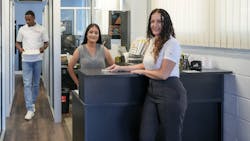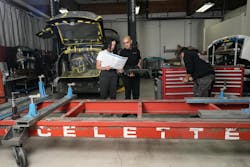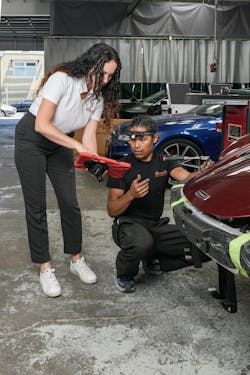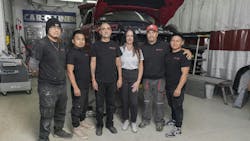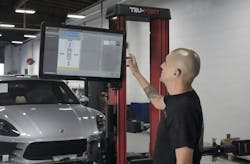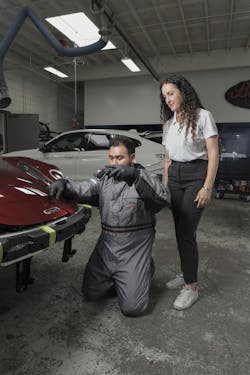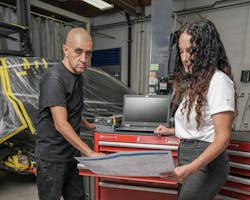It was just after high school, at age 19, when Amber Alley landed her first role in a collision repair shop. During the day, she answered phones and learning how to hand-write estimates using Mitchell books. At night, she attended college for investment banking. But she soon realized she enjoyed the variety and learning new skills in the body shop. About 30 years later, she can’t imagine doing anything else.
“I liked the challenge of the office, and really, just hanging out with the people in the shop, too,” she says. “I'm so much happier in this industry working with the people that I do and not in a cubicle somewhere.”
That job led to a position at another collision repair shop for eight years, which was managed by the owner and would be for the foreseeable future. She was ready for her next challenge, and she found a home 21 years ago as assistant manager at Barsotti’s Body & Fender in San Rafael, California, where since 2008 she has been manager, overseeing a staff of 40. Alley has continued a culture of quality instilled at Barsotti’s before her arrival, and she’s also fostered team-based work structures, OEM certification, training, and quality repairs. Meanwhile, she’s found the time to devote to various leadership roles within the Society of Collision Repair Specialists (SCRS), including currently serving as chairwoman of the organization. It’s for those reasons that Alley is our choice for this year’s FenderBender Award.
A Focus on Quality
Alley describes the work environment at Barsotti’s as always having been a “little different” since before she started, with a focus on OEM certification for highline brands to serve area dealerships, training, taking care of the staff and “doing it right.” A year after she arrived, the shop was one of the first 10 in the country to be certified by Audi for its aluminum repair program. Other OEM-certified repair programs – which now number about two dozen – soon followed.
That focus was a bit of a departure from her previous shop, which was mostly driven by direct repair program work.
“It just kind of represented everything that I wanted, to learn more and challenge myself to learn a different kind of business model.”
Committed to Being the Best They Can Be
In her nomination by a former employee who had moved out of the area, Alley was praised for caring about customers and workers and for her attention to detail for the repairs delivered by the shop.
Alley humbly accepts the praise and points to the longevity of most staff members as evidence it’s a good workplace for those who share the same focus on quality. Most technicians have been working at the shop for over five years, and many are nearing 15 years’ tenure.
“It's family first, right? You're here all day with people you know. You want to make sure that they're taken care of and is happy as they're going to be. It doesn't mean everything is always perfect,” Alley says.
The shop’s team structure requires a mix of staff who are great teachers and leaders.
“You learn how people work, and it can be difficult, because the demands are high. It's a lot easier to say, ‘It's OK; good enough is good enough.’ Not that it's easy to have to constantly keep 40 people focused on trying to be the best that they can be. So, we do invest a ton in training.”
In addition to OEM training for the certification programs, the shop includes a lot of I-CAR training, and most technicians are Platinum-recognized, Alley says. The shop also has ASE-certified technicians and takes advantage of training from Axalta and 3M.
“Pretty much any training that's out there, we try to get. And we do a lot of cross-training here, so we're covered if one person's out sick or is on vacation.”
Providing a Career Path
The training and a career path are what job applicants look for, she says.
“When I hire people, a lot of times they'll tell me, ‘I am coming here to apply because I'm not given an opportunity somewhere else, and I want the opportunity to better myself.’”
The focus on quality means those who are not committed to that culture of quality “don’t survive” the rework measures needed until the vehicle is correctly repaired.
“Something happens, and we might need to paint it again. Your bodywork’s not right? Take it all off and do it again. You have to be of the mind to want to be the best yourself to survive in that environment. Most of the time we've lost people, it's either because they move out of the area or life takes them in a different direction. Or it's because they just want to do ‘OK, that's good enough.’ We're not the shop for ‘good enough.’ Sometimes when I've been looking for people in the past, I don't understand how ‘ABC Body Shop’ down the street gets so many people who apply there, and we don't get anybody. And my guys have to remind me, ‘That's because they can make almost the same amount working there and not put up with your bull****.’ It's not me.
"But we laugh about it because it is kind of true, you know? Do you want to be a master, or do you want to just be good enough? And that's kind of the difference, but it works. It's been a good business model for us.”
Apprenticeships Through the Collision Engineering Program
It was through her involvement at SCRS that Alley first learned of the Collision Engineering program, which rotates eight-week blocks of study at a participating college and apprenticeships at a cooperating collision repair shop. It helps fulfill the industry’s need for bringing in trained employees, Alley says.
“I reached out early on, and I’m so thankful I did.”
Alley says it’s been through the help of Laura Lozano, department chair of Collision Repair at Contra Costa College – also where Alley attended for investment banking – that she has adapted to mentoring. Not everyone is naturally an effective teacher, she notes, and not everyone learns the same. She has developed one technician through the program who’s graduated. He is now a full-time worker with his own work bay and is now going through training for Toyota certification.
“We’re still developing his talent, but the thing about that program is it really brings it all together. The difference between hiring someone who walks in off the street and hiring someone from a program like that is that they've already invested in themselves, right? They're going to college and investing in their future. They're going through the training program and you're working with the school to identify their personality, how they work, how they learn, all those things.”
She’s also mentoring another apprentice in the program. The balance of time spent in the classroom and lab and at the shop enhances how the students learn and are able to apply what they’ve learned, Alley says.
“I don't know that a lot of people understand is that, but they're also taking their algebra class and their English class and their Anthropology class. And some of that is really tough. Especially if you're just trying to go into a trade, school may not be your thing.”
Leading in a Male-dominated Industry
As a woman in a male-dominated field, Alley says she hasn’t felt the pressure of discrimination.
“But I do think I've had to work harder being a woman. And with age comes confidence, you know? I'm at a point in my life where half the time I don't care what people think, and then the other half I feel confident with what I know and the experiences that I've had to put myself out there. When you're young, that can be very intimidating.”
She has been involved in SCRS for about 10 years and quickly saw the value of being involved with like-minded people facing similar challenges.
“When you do something every day, the color of the walls never changes, right? So you get out and come back, and you see things differently, even the color and paint. And you’re like, ‘I could really clean this place up.’ You go and talk to people who are dealing with similar issues and have that brother and sisterhood.”
It requires a large time commitment to serve on the board, including the number of phone calls and traveling across the country for meetings.
“It’s literally like another job,” she says. “But it’s very rewarding.”
How the Industry is Changing – And Still Needs to Adapt
While attending a recent Lucid conference in Scottsdale, Arizona, a personal experience was an example of just how much cars are changing and why it’s critical to follow OEM repair instructions. After requesting a ride through Uber, a Waymo autonomous vehicle was dispatched to pick her up. It got confused in how to reach her pickup point, and the app was directing her to walk three blocks to a different pickup point that was 12 minutes away in the 112-degree heat. So, it’s no surprise she canceled that ride.
Technology hiccups aside, she doesn’t see self-driving vehicles going away.
“We've gone through aluminum, and we've gone through electric. And somehow, everybody keeps saying this is going to be the game-changer. But we all keep operating the same, right?”
She sees the industry at large as writing deficient estimates and counting on a bit of luck.
“The industry hasn't grasped the call for action. I can't imagine if I repair a car like a Waymo and then it makes a U-turn and then it goes into oncoming traffic and hits someone and kills them.”
She also sees a time when car insurance may become more like health insurance, with menu pricing, and in which collision repairers are more comfortable collecting for what’s covered and what’s required for the repair.
“You want the porcelain crown? Well, you’re going to have to pay for it. You want the OEM fender? You’re going to have to pay for it.”
With recent aggressive cost-cutting by insurers, she sees that coming sooner than later.
With all the natural catastrophes, there are these states like the one I'm in where they're not even wanting to insure folks, or people are seeing their premiums double or triple. That's going to all get passed onto the repairer. They’re going to not want to compensate for this and not want to compensate for that.”
She predicts it will be written into the policy language.
“And we the shops will be — as we are now — forced to deal with that and make a decision. Do you want to cut corners or do you want to do it right? And if you want to do right, you're probably going to have to ask someone to help pay for it.”
About the Author
Jay Sicht
Editor-in-Chief, FenderBender and ABRN
Jay Sicht is editor-in-chief of FenderBender and ABRN. He has worked in the automotive aftermarket for more than 29 years, including in a number of sales and technical support roles in paint/parts distribution and service/repair. He has a bachelor's degree in journalism from the University of Central Missouri with a minor in aviation, and as a writer and editor, he has covered all segments of the automotive aftermarket for more than 20 of those years, including formerly serving as editor-in-chief of Motor Age and Aftermarket Business World. Connect with him on LinkedIn.
Don't miss Jay's next article or podcast. Sign up for FenderBender Today's Collision Repair News and ABRN eNews here.
